If you're a frequent visitor to Healthify, why not share our site with a friend? Don't forget you can also browse Healthify without using your phone data.
Concussion
Mild traumatic brain injury (mTBI)
Key points about concussion
- A concussion is a mild traumatic brain injury (mTBI). It happens when a bump, blow or shake to your head or body transmits a force to your brain.
- You may or may not lose consciousness.
- A concussion affects how your brain functions. Symptoms vary but include headache, nausea, dizziness, loss of balance, poor memory or concentration, mood changes, fatigue and sleepiness.
- It’s important to rest your brain and your body if you’ve had a concussion, especially in the first 48 hours. After that, return to normal activities including light aerobic exercise gradually, based on your symptoms.
- If you think you've had a concussion, see a healthcare provider as soon as possible.
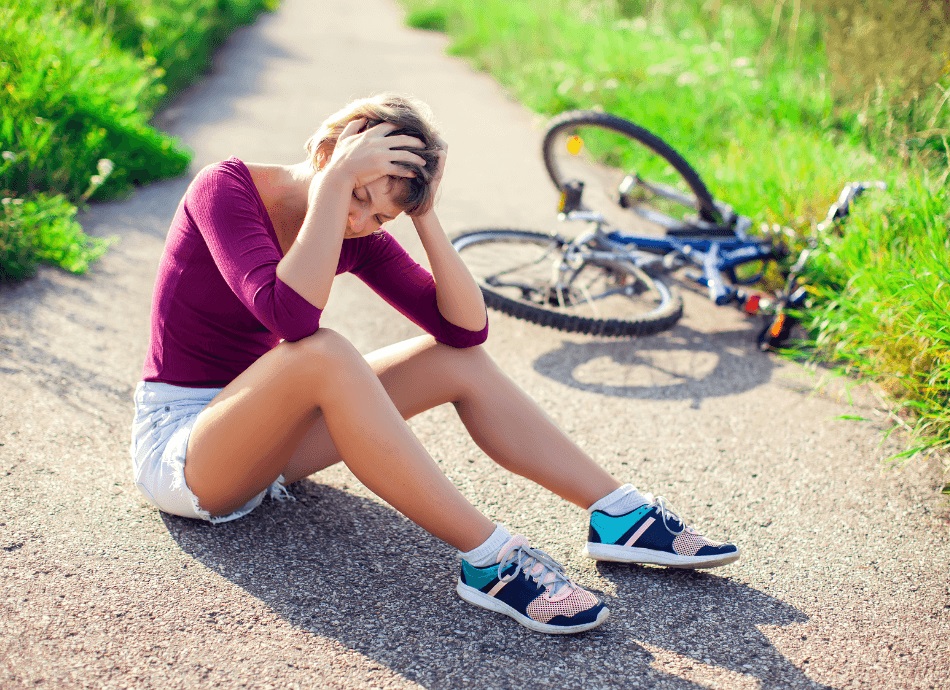
A concussion is a type of mild traumatic brain injury (mTBI). It occurs when a bump, blow or shake to your head or body transmits a force to your brain. This does NOT cause any bleeding, bruising or swelling in the brain – for this reason, scanning your brain is not helpful to diagnose concussion. However, it causes a change in the brain's cells, essentially altering their function. This is due to chemical changes within the cell.
You don't have to get a blow directly to your head itself – impact anywhere on your body can transmit forces to your brain.
You also don't have to be knocked out to get a concussion. In fact, loss of consciousness only happens with 10% of concussions.
Video: Concussion management and return to learn
The following video by Dr Mike Evans provides a useful summary of the key points to know about concussion and its management.
If you or someone else has had (or may have had) a concussion, it needs to be taken seriously. See your healthcare provider as soon as possible.
If you have a head injury and possible concussion while playing sport, you should stop playing IMMEDIATELY and get assessed by a healthcare provider. Don’t return to sport/activity on the day of a suspected concussion.
The first 24 hours after having a brain injury are crucial. You should seek urgent medical help (either go to A&E or call 111 for an ambulance) if you or someone you are caring for:
- has a headache that gets worse, that isn't relieved with simple pain relief such as paracetamol
- is very sleepy or difficult to wake
- is confused or doesn’t recognise you
- has fits or seizures (repeated jerking movements of arms, legs or face)
- has strange feelings or loss of movement down one or both sides of the body
- slurs their speech
- has blurred vision bad enough to stop seeing properly
- has double vision
- is increasingly irritable or restless
- vomits more than once
- complains of neck pain
- has ongoing severe dizziness
- has prolonged amnesia (more than 12 hours after the injury)
- has behavioural changes (eg, increasing restlessness or agitation)
- passes out.
See other symptoms of concussion below. Call Healthline free on 0800 611 116 if you don't know what to do.
Anyone who knocks their head (playing a sport or through a fight or accident) and gets up straight away, still needs to be closely watched as they may develop symptoms after the injury, usually within that day. If they show any of the warning signs above, they need to see a healthcare provider as soon as possible.
If they've been knocked out (become unconscious) they should see a healthcare provider that day to make sure there's nothing more serious going on.
A concussion can happen to anyone. Common events causing concussion include:
- Falls: These are the most common cause of concussion overall, particularly in older adults and young children. Find out about tips to prevent falls.
- Vehicle-related collisions: Collisions involving cars, motorcycles or bicycles – and pedestrians involved in such accidents.
- Domestic violence: This, child abuse and other assaults are common causes.
- Sports injuries: Concussions are a common type of sports injury. Higher risk sports for concussion include contact activities such as boxing and martial arts and contact sports such as rugby. It can also occur in any sport with fast movement or balls (eg, cycling, equestrian activities, cricket, hockey, water polo, snow sports), but can occur across all sporting activities.
People under the age of 30, males and Māori and Pacific Peoples are at increased risk of concussion in Aotearoa New Zealand.
Symptoms of a concussion or mild traumatic brain injury (mTBI) may not appear straight away. They may appear a few hours later but generally within 24 hours.
If you've had a concussion, or think you have, it needs to be taken seriously. See your healthcare provider as soon as possible if you notice any of the following signs of concussion.
- Physical symptoms: sensitivity to light or noise, dizziness or 'seeing stars', excessive or unusual fatigue, headache, nausea and vomiting, blurry vision.
- Emotional symptoms: feeling particularly anxious, irritable, moody, or sad.
- Thinking and remembering: having difficulty paying attention, feeling confused, memory problems, feeling foggy, difficulty attending work or school.
- Sleep: sleeping too much or too little, trouble falling asleep.
If you're watching somebody else, here are some immediate signs of a concussion. They may:
- lose consciousness – though this doesn't have to happen for them to be concussed
- appear dazed or confused
- slur their speech
- forget what happened
- ask the same question again
- vomit (be sick)
- lose their balance.
Not every sign and symptom will be present in every person and some may not appear for hours or days following a head injury.
Fortunately, these symptoms are usually temporary. However, if you don't let your brain fully recover, you're at risk of:
- further brain injury or concussion
- musculo-skeletal injury (injury to your muscles or bones)
- longer recovery time if you have a second concussion
- second impact syndrome – when having a second concussion before you've fully recovered from the first leads to swelling of your brain.
If you get a concussion, you need to be seen by a healthcare provider either at your GP clinic, an urgent care clinic or a hospital emergency department.
A healthcare provider will diagnose concussion based on your symptoms (these could be physical, cognitive, behavioural or emotional – see above), a history of injury, and examination of your nervous system to check how well your brain is functioning, and after ruling out more serious external head or brain injuries. Sometimes video footage of the incident is useful to assist with a concussion diagnosis.
Lab tests or imaging tests aren’t usually needed unless there are concerns about a more serious head injury or brain injury.
The healthcare provider will ask you about any recent accidents or injuries, including what happened, when and where it happened, what happened straight afterwards and up until the time you came to the clinic, and whether you’ve had concussion before. If your memory is affected you may need a witness to tell the healthcare provider what happened.
Your healthcare provider will also examine you to rule out any serious head or spine injuries.
Brain injury severity is classified based on how long you were unconscious for (if at all), how long you experienced post-trauma confusion or memory loss for and your Glasgow Coma Scale score. The Glasgow Coma Scale is a medical tool that assesses your level of consciousness based on whether you can open your eyes by yourself, how well you can answer certain questions and how well you can move your body. Read more about the Glasgow Coma Scale (GCS)(external link). Mild traumatic brain injury (including concussion) is when you lose consciousness for less than 30 minutes, with a GCS of 13 to 15 and have post-traumatic amnesia for less than 24 hours.
Your healthcare provider may also use a concussion screening tool, which is like a questionnaire, to assess you. This can also be used to monitor your improvement over time.
Treatment of concussion focusses on physical and mental rest in the first 24 to 48 hours after your injury, followed by a gradual return to your normal activities. Your healthcare provider will give you advice about what you should do (see self-care section below).
Don’t return to sports activities or work/school (where any further injury is a risk) before you’ve been cleared as safe to do so. To prevent ongoing effects from a concussion, it's important that you've fully recovered before returning to recreational or competitive sports, or activities that could have a risk of a further head injury.
You should see your healthcare provider at a follow-up visit after 7 to 10 days so they can check your symptoms (if you still have any) and adjust your management plan if needed.
Your healthcare provider will also complete ACC forms so that you’re able to get time off work (or reduced duties), compensation payments, and access to concussion treatment if needed.
If your symptoms continue for more than 2 weeks, see your healthcare provider again. For people with ongoing symptoms, referral to a concussion service may be needed.
- ACC’s Concussion Service provides early intervention rehabilitation services for ACC clients with a mild to moderate traumatic brain injury.
- Referrers can refer people with a diagnosed or suspected concussion directly to a concussion service provider. No prior approval from ACC is required.
Find a concussion service provider in your area(external link).
If at any point your symptoms get worse, or if more serious symptoms develop (see the warning signs listed above) you should see a healthcare provider straight away.
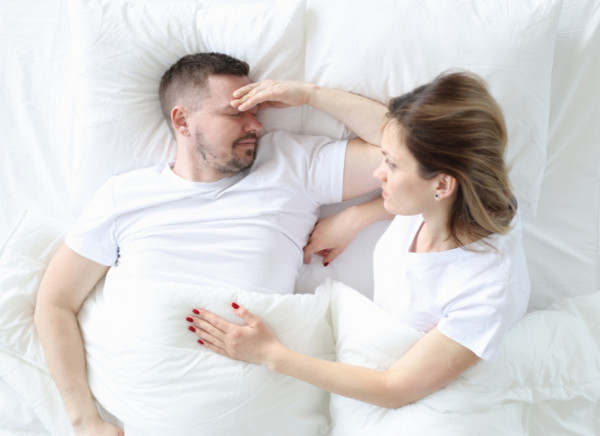
Image credit: Canva
There are things you can do to improve your recovery time after a concussion.
- Take physical and mental rest for the first 24 to 48 hours after your injury. Avoid strenuous physical activity, listening to loud music, reading and screen time, including video games, watching TV or using a computer.
- After this, talk to your healthcare provider about making a plan for a gradual return to normal activities (see below).
- Use paracetamol for any headache in the first 48 hours. You can add an NSAID, eg, ibuprofen, naproxen or diclofenac, after this if you need to.
- Use an ice/cool pack on your head injury if needed. Apply ice or a cool pack to the injury for 10 to 20 minutes, every 2 to 4 hours, as needed for 1 to 2 days after your injury. Ice wrapped in a tea towel or a pack of frozen vegetables will work well. This will reduce swelling of the scalp and help with the pain.
- Stay hydrated. Drink clear fluids to reduce the chance of vomiting (being sick). Clear fluids include plain water, fruit juices without pulp, clear sodas such as ginger ale or lemonade, and tea or coffee without cream or milk.
- Avoid substances that negatively affect your brain, eg, alcohol and illegal substances/drugs.
- Eat and sleep well. Nausea (feeling sick) is often a symptom of concussion so smaller more frequent meals may be better tolerated. Your body will need energy to assist with your concussion recovery. Read about tips to help you sleep better.
- Ask your whānau and friends for support. They may also need to get some support to understand and help you with your recovery.
Slowly return to your normal activities as your symptoms allow
- After 24 to 48 hours’ rest, gradually return to your regular daily activities at a level that does not worsen your symptoms. It's okay to have some symptoms as this is often normal, but activities such as physical exercise or cognitive activities such as schoolwork should not worsen your symptoms. If they do, then stop and try again in 24 hours. You could consider reduced or flexible work hours if possible and talk to your employer/school about working in a quiet, supportive and supervised environment.
- Use your symptoms to guide you on how much to do – mentally and physically. Activity should be at a level that doesn't make your symptoms worse.
- Read advice from ACC about recovery after a concussion(external link) which includes examples of physical and brain recharging activities you can do.
- Let your teacher, employer and/or sport coach know about your injury.
- If you play competitive sport:
- you should be free of symptoms for 14 days before you return to contact training
- return to sport competition no sooner than 3 weeks after your injury and only if you’ve made a full return to work or school and don’t have any symptoms
- it's best to have your healthcare provider give you clearance to return after this time period.
See the ACC Sport Concussion in New Zealand National Guidelines(external link). Some sports bodies have specific concussion protocols you may need to follow so check with your particular sports code.
Driving
Don’t drive for at least 24 hours. If you drive a commercial vehicle, don’t drive for 48 hours and you’ll need to be reassessed before you start driving again.
You shouldn’t drive until any symptoms of dizziness have gone away, you can focus your attention for long periods, you can react quickly to unexpected hazards, your ability to judge distances is normal, and you have clearance to drive from your healthcare provider.
Read more about head injuries and driving(external link).
If you need help with transport, you can contact a local Brain Injury New Zealand branch for support, or you may be able to get assistance through ACC.
Video: Josh’s recovery at work | ACC New Zealand
(ACC, New Zealand, 2022)
Apps reviewed by Healthify
You may find it useful to look at some concussion apps and first aid and emergency apps.
There are things you can do to reduce the risk of a concussion for you and your child.
- Use safety equipment, such as seat belts, bicycle or motorcycle helmets, and hard hats, during activities that could cause a head injury.
- Always use child safety seats in a car.
- Follow bicycle safety recommendations(external link).
- Don’t drive (or be driven) under the influence of alcohol or drugs.
- Check your risk of a fall(external link) and find out what you can do to reduce the chances of a fall.
- Install window guards and stair gates to prevent children from falling at home.
- Find out about preventing family violence.
- Follow the rules of your sport and limit the number of contact practices for contact and collision sports.
- Neck strengthening exercises for contact sports and use of mouthguards may be useful.
If you’ve had a concussion, you should avoid activities that put yourself at risk of a crash, collision, or contact. The effects of another brain injury can be much worse especially if you haven’t fully recovered yet. If you have another injury, it’s important to seek medical advice quickly.
Apps reviewed by Healthify
You may find it useful to look at some falls preventions apps.
Many adults recover from a sports-related concussion within 2 weeks, and almost all recover within 2 months. Recovery can take longer in children and teenagers (under 18 years of age) or those with a non-sport-related concussion.
Recovery time is better when you understand what concussion is, how it’s managed and what to expect during your recovery. You also improve your chances of a good recovery if you can stick to the advice given to you about self-care and a gradual return to normal life after you’ve had a concussion.
Some people have symptoms, such as fatigue, headache or memory problems, 3 months or more after their concussion injury. These are known as persistent concussion symptoms. If you continue to have symptoms after 4 weeks, see your healthcare provider.
People at risk of prolonged recovery after concussion include those with:
- severe initial symptoms
- previous concussion(s) with a prolonged recovery or another complication
- pre-existing mental health conditions.
What is a brain injury?(external link) Brain Injury NZ
Head injuries and concussion(external link) Health New Zealand | Te Whatu Ora
Sport Concussion in New Zealand – National guidelines (external link)ACC, NZ
Live stronger for longer – prevent falls and fractures(external link) An Aotearoa New Zealand website created by ACC and other partners that’s dedicated to helping older adults prevent falls and stay healthy.
Brochures
Recovery advice Whakaora Tohutohu for patients – concussion/mild traumatic brain injury (MTBI)(external link) Accident Compensation Corporation (ACC), NZ, 2022 te reo Māori(external link)
Caring for your child after their head injury(external link) Accident Compensation Corporation (ACC), NZ
Fact sheet – concussion recovery(external link) Rugby Smart, NZ
Apps
References
- Concussion(external link) Mayo Clinic, US, 2024
- Sport concussion in New Zealand – National guidelines(external link) ACC, NZ, 2024
- An overview of concussion/mild traumatic brain injury management for primary healthcare professionals(external link) BPAC, NZ, 2024
- Head injuries in adults(external link) Auckland HealthPathways, NZ, 2024
- Recovery advice Whakaora Tohutohu for patients – concussion/mild traumatic brain injury (MTBI)(external link) ACC, NZ, 2022
- Traumatic brain injury(external link) MedlinePlus, US, 2024
- Concussion – symptoms, causes, diagnosis and treatment(external link) Healthline, US, 2023
- Traumatic brain injury and concussion(external link) US Centers for Disease Control and Prevention CDC, 2024
Tools
The Brain Injury Screening Tool (BIST) (external link)AUT Traumatic Brain Injury Network, NZ
Concussion recognition tool (CRT6)(external link) 2023
Sport concussion assessment tool (SCAT6)(external link) 2023
Sport concussion assessment tool – child (child SCAT6)(external link) 2023
Apps
Concussion apps
First aid and emergency apps
Clinical pathways and guidelines
- Referring a patient for rehabilitation(external link) ACC, NZ, 2023
- Sport concussion in New Zealand – National Guidelines(external link) ACC, NZ, 2024
- Pathway for head injury(external link) NICE, UK, 2023
- Head injury – paediatric clinical guidelines(external link) Starship Children's Hospital, NZ, 2023
- Concussion(external link) B-QuiCK BPAC, NZ
- Living Concussion Guidelines – Guideline for Concussion & Prolonged Symptoms for Adults 18 years of Age or Older(external link) Ontario Ministry of Health, Canada
- Patricios JS, Schneider KJ, Dvorak J, et al. Consensus statement on concussion in sport – the 6th International Conference on Concussion in Sport–Amsterdam, October 2022(external link) BJSM 2023;57:695-711
- If in doubt, sit them out – UK concussion guidelines for non-elite (grassroots) sport(external link) UK Govt, 2023
Continuing professional development
An overview of concussion/mild traumatic brain injury management for primary healthcare professionals(external link) BPAC, NZ, 2022
Concussion management in children(external link) Goodfellow Podcast, 2019
Shorter waits after brain injury – academic says ACC changes for referrers are making a difference(external link) NZ Doctor, 2023
Presentation: HealthPathways days 2023 – paediatric concussion by Dr Stephen Kara (12 mins)
(Goodfellow Unit, NZ, 2023)
When should I go to hospital for concussion?
You should go to the nearest hospital emergency department or call 111 if you or someone you’re caring for has had a head injury or knock to the head and is very sleepy or difficult to wake or has any of the following: worsening headache, confusion, seizures, loss of movement, slurred speech, vision problems (eg, blurred vision or double vision), vomiting, neck pain, severe dizziness, memory loss more than 12 hours after the injury, behavioural changes (eg, increasing restlessness or agitation), or passes out.
Can I play sport again if I’ve had a concussion?
If you have a head injury and possible concussion while playing sport, you should stop playing and get assessed by a healthcare provider. Don’t return to sport/activity on the day of a suspected concussion.
You should take physical and mental rest for the first 24 to 48 hours after your injury. You can then make a gradual return to activities including sport, under the guidance of your healthcare provider.
If you play competitive sport you should be symptom-free for 14 days before you return to contact training, and don’t return to competition sooner than 3 weeks after your injury.
How many concussions is too many?
There is no specific number of concussions that indicate concern. However you should seek medical advice if you have:
- had a 2nd concussion within 3 months of a previous one
- had 3 concussions in 12 months
- had 5 or more concussions in your lifetime, especially if you're involved in sport
- have had concussion symptoms after a milder impact this time around
- have had previous concussions and the time to recovery is getting longer and longer (must be over 4 weeks at least)
- have had a previous concussion complicated by a mental health or psychological issue.
Brochures
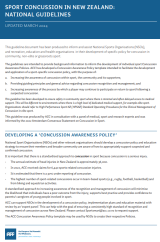
Sport concussion in New Zealand – national guidelines
Accident Compensation Corporation (ACC), NZ, 2023
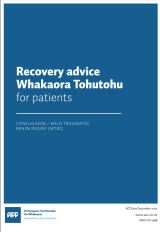
Recovery advice Whakaora Tohutohu for patients
Accident Compensation Corporation (ACC), NZ English, te reo Māori
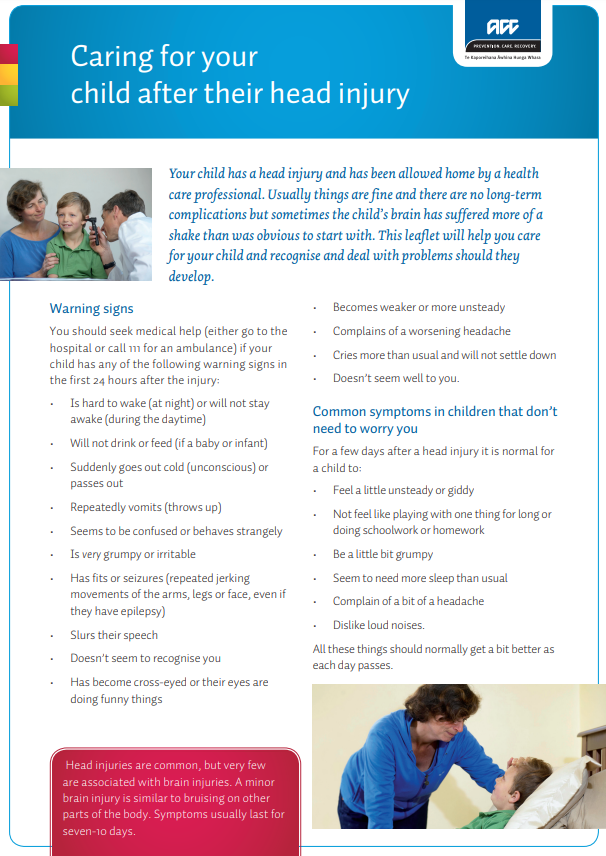
Accident Compensation Corporation (ACC), NZ, 2022
Credits: Healthify editorial team. Healthify is brought to you by Health Navigator Charitable Trust.
Reviewed by: Dr Stephen Kara, Sport and Exercise Physician, Queenstown
Last reviewed:





